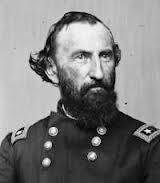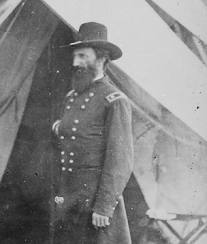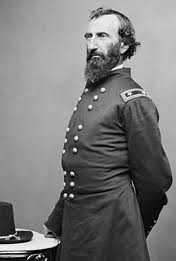 McClernand, learned the hard way, that Two Civil War Generals are Company, but Three’s A Crowd. John McClernand was the perfect example of a politically appointed General, competing with Army officers who were graduates of the United States Military Academy. General McClernand was enthusiastic, enterprising, courageous, brash, and undisciplined. He was also trouble. For President Lincoln, General McClernand was both a political asset and a military problem. General’s Grant and Sherman had a stealthy strategy to eventually quell the rebellion and those plans did not include General John McClernand.
McClernand, learned the hard way, that Two Civil War Generals are Company, but Three’s A Crowd. John McClernand was the perfect example of a politically appointed General, competing with Army officers who were graduates of the United States Military Academy. General McClernand was enthusiastic, enterprising, courageous, brash, and undisciplined. He was also trouble. For President Lincoln, General McClernand was both a political asset and a military problem. General’s Grant and Sherman had a stealthy strategy to eventually quell the rebellion and those plans did not include General John McClernand.
John Alexander McClernand, born in 1812, in Kentucky and was raised in Illinois. McClernand was admitted to the Illinois bar in 1832, after which he worked as a trader for a couple of years and later established a newspaper, the Shawneetown Democrat. He
was elected to the Illinois Legislature four times and to Congress for the first time in 1843, serving four terms, leaving in 1851. He was again elected to Congress in 1861, but with the beginning of the Civil War, McClernand resigned from Congress and started raising a brigade of volunteers. Eager to maintain a wide base of support for the war, Lincoln appointed the Democrat McClernand, a brigadier general of volunteers on May 17, 1861.
McClernand was given a brigade in Missouri, serving under General Ulysses S. Grant, and performed well at the engagement at Belmont, Missouri, where the Union forces surprised the Confederates and pushed them from their positions. Believing the day was won the Union soldiers began celebrating and McClernand started a political speech. However, the Confederates ferried reinforcements across the Mississippi, rallied, and routed the attackers. McClernand cut short his self-aggrandizement and Grant recognized the potential problems that his subordinate might cause.
 President Lincoln had developed long-standing relationships with many Douglas Democrats in Illinois. He recognized that their active support was key to the political stability of the state. He therefore gratified the desire of McClernand, John A. Logan and James Shields to become generals. After the Battle of Belmont in early November 1861 in which McClernand took a leading part, President Lincoln wrote him: “This is not an official but a social letter. You have had a battle, and without being able to judge as to the precise measure of its value, I think it is safe to say that you, and all with you have done honor to yourselves and the flag and service to the country. Most gratefully do I thank you and them. In my present position, I must care for the whole nation; but I hope it will be no injustice to any other state, for me to indulge a little home pride, that Illinois does not disappoint us.”
President Lincoln had developed long-standing relationships with many Douglas Democrats in Illinois. He recognized that their active support was key to the political stability of the state. He therefore gratified the desire of McClernand, John A. Logan and James Shields to become generals. After the Battle of Belmont in early November 1861 in which McClernand took a leading part, President Lincoln wrote him: “This is not an official but a social letter. You have had a battle, and without being able to judge as to the precise measure of its value, I think it is safe to say that you, and all with you have done honor to yourselves and the flag and service to the country. Most gratefully do I thank you and them. In my present position, I must care for the whole nation; but I hope it will be no injustice to any other state, for me to indulge a little home pride, that Illinois does not disappoint us.”
In February 1862, Grant elevated McClernand to command of the 1st Division, Department of the Missouri, which he led in the advances on Forts Henry and Donelson. The U. S. Navy, under Admiral Foote, took Fort Henry without any help from the Army. But at Fort Donelson, McClernand, on the right flank, was attacked by the Confederates and was being pushed back when Grant arrived to take control and stop the Confederate advance. Despite his error at Fort Donelson, McClernand received a promotion to major-general on March 21.
In April of 1862, McClernand’s division was one of the hardest pressed on the first day at Shiloh. It was camped next to Sherman’s division, and McClernand was later to acknowledge how valuable Sherman’s presence had been. McClernand’s corps lost 285 killed, 1370 wounded and 85 missing, compared to Sherman’s 323 dead, 1249 wounded and 299 missing.
 McClernand spent much of 1862 waging a political assassination of General Grant. On a leave of absence from his division in October, he traveled to Washington to lobby Lincoln directly. Desiring to maintain a Democrat in a senior military position, Lincoln ultimately granted McClernand’s request and Secretary of War Edwin Stanton gave him permission to raise troops in Illinois for an expedition against Vicksburg.
McClernand spent much of 1862 waging a political assassination of General Grant. On a leave of absence from his division in October, he traveled to Washington to lobby Lincoln directly. Desiring to maintain a Democrat in a senior military position, Lincoln ultimately granted McClernand’s request and Secretary of War Edwin Stanton gave him permission to raise troops in Illinois for an expedition against Vicksburg.
After his recruitment duties, Lincoln put him in charge of the Vicksburg operation, but Grant and Sherman started the campaign before McClernand arrived to take command. McClernand was to lead Grant’s army marching down the west bank of the Mississippi, in order to cross the river and besiege Vicksburg. At the start of the siege, Grant had launched two direct assaults on the Confederate lines, in the hope that the Confederates were sufficiently demoralised to allow for an easy victory. Although these attacks failed, McClernand issued a congratulatory order to his troops, phrased in a way that greatly annoyed Grant’s other corps commanders. McClernand’s real problem was that the order had been published in northern newspapers. This was in contravention of both War Department and Grant’s own orders and gave Grant the reason he needed to get rid of McClernand. Two weeks before the fall of Vicksburg he was relieved of command
of the Thirteenth Corps, and ordered back to Illinois.
What really injured McClernand was not only Grant’s loss of patience, but also Sherman, John Rawlings, and James Harrison Wilson were fed up. Even Charles Dana, the War Department’s civilian eyes and ears, harbored a contempt for McClernand.
President Lincoln, saw the importance of placating a leader of the Illinois War Democrats and in January of 1864, McClernand was reappointed to command of the 8th Corps in the Red River campaign. However, on November 30, 1864 he resigned his commission due to malaria and returned to Springfield, Illinois.
After the war, McClernand practiced law in Illinois. In 1870, he was elected to the circuit court and served on the bench for 3 years. He stayed politically active, even presiding at the 1876 Democratic National Convention in St. Louis, Missouri. Despite his resignation, he was able to receive an Army pension due to an act of Congress.
McClernand died on September 20, 1900 in Springfield, Illinois, and is buried in the Oak Ridge Cemetery.
Very few of the political generals were popular with the West Point graduates. It must also be remembered that the Grant/Sherman strategy for victory in the Western Theater did not include McClernand and that Two Civil War Generals are Company, but Three’s A Crowd.
Bummer


Another bad Union general who got his job only because of politics – this can come to sound like the broken record of Civil War history, can’t it?
Louis,
So many incompetent Union Generals, paid back with pensions for life. Need to explore a more up-beat aspect of the Civil War. It is a broken record, will attempt another avenue of research. Not only for the readers, but the writer really needs it. Hang in there.
Bummer